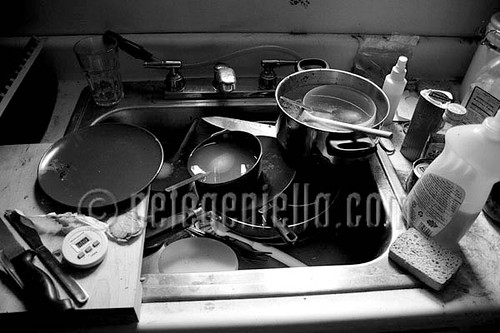Every one of us has burned something while cooking, but what we do with the mess that remains after the meal is an important choice. Sometimes it's difficult to get those nasty grease and burn stains off of your pots and pans, but it's imperative that you do! If you don't, you'll be cooking that burned, caked-on mess into every meal you make in that pan going forward. Why muddy your delicious culinary endeavors with that nasty charcoal-y taste!?

Now, we all have different types of pans, so I'll try and touch on a bunch of them:
Stainless Steel: Soak your pot for a little while with dish detergent and then get a Brillo pad
Non-stick surface: Well, the point of a non-stick pan is that things DON'T stick to it...but that's not always the case. If you get some stains, soak the pan in dish detergent to loosen the mess. Then, use a soft sponge
Cast Iron: NEVER use soap on a cast iron pan. If you own a cast iron pan, keep a separate scrub brush, something a little bit more abrasive than the soft sponge, but definitely not steel wool. Once the water runs clear and a paper towel wipes clean, take a fresh paper towel and pour some olive oil on it. Wipe the olive oil all over the inside of the pan and rub it in. This seasons and preserves the cast iron and it is the ONLY way to take care of this type of pan.
I'd also like to give you a tip that I learned from a friend today. If you boil some vinegar and water in the pan for about 20 minutes, it should loosen the grease and burned bits. I've never used this method because I hate the smell of vinegar, but she swears by it so I thought I would throw that in there as well. Just a warning: it can get pretty smelly. (Thanks, Rae!)

I hope that these cleaning tips help you keep those pots looking shiny and new ... just awaiting your next creation! The cleaner you keep them, the fresher your food will taste, and ... why eat it if it doesn't taste fresh!?
Now, get scrubbin'! xoxo

What happens if you use soap on cast iron? I've never heard that before.
ReplyDeleteThank you for your question! Let me start by saying that seasoning a cast iron pot is a natural way of making non-stick cookware...the older, and more seasoned your pot is, the easier it will be to cook eggs and things of that nature in the pan. The way a NEW cast iron pan is seasoned is with heat and grease, which soaks into the iron. I recommend buying a pre-seasoned pan ... less work for YOU and there are people who KNOW how to do this...I do not. I bought mine at a thrift store that advertised the pre-seasoned pans...they are more expensive, but its worth it because some of them are hundreds of years old and it's kind of a cool piece to keep in your kitchen, don't you think? I believe that mine is from 1917. Once it's been seasoned, you don't want to wash that away, and soap will do that. It will also damage the finish of the iron, sometimes causing a strange residue to appear as well. If you are weirded out about not using soap on the pan, you can boil water in it to kill any bacteria that might be residing there, but really, wiping it clean and using a coat of olive oil is enough to clean that pan. As a side note, you should also NEVER use soap on a pizza stone...for similar reasons.
ReplyDeleteVinegar is a miracle cleaning agent, if you can get past the initial stink of it. So is baking soda. A little baking soda and water can take care of a messy stainless steel sink. (Thanks to HGTV for that little tidbit.)
ReplyDeleteAnother really good way to clean these things is using salt - I prefer coarse grained salt (kosher, etc). Basically, it will increase the abrasiveness of whatever you're using to scrub while actually absorbing the used grease, etc. Just make sure you do a first washing and then let it dry first. Best for the REALLY hard to get off gunk.
ReplyDeleteMake sure that if you use the salt, you use it to soak up the grease and then abrasively scrape at the burned bits. Definitely do not use salt in a completely dry pan, nor should you use it with a sponge in a wet pant.
ReplyDelete